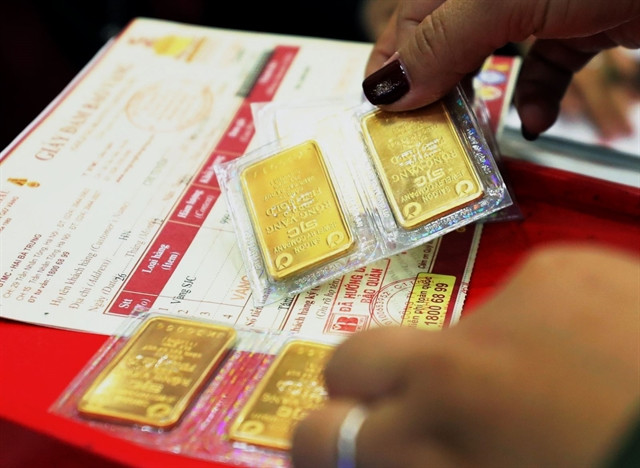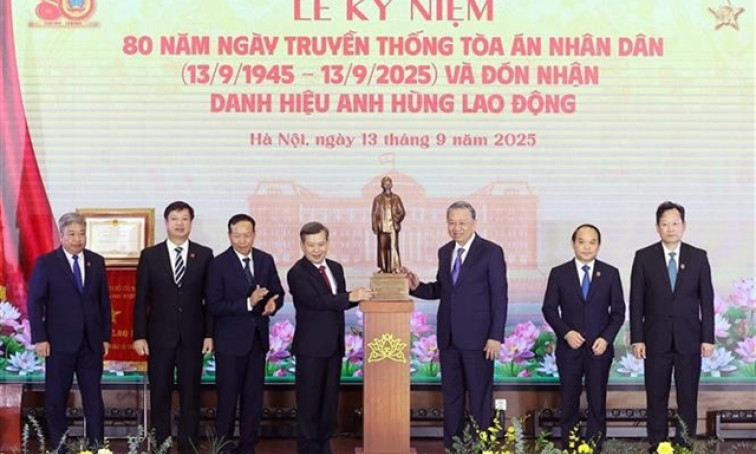Reform in gold trading regulations is expected to happen this month
Việt Nam expects to make a significant shift in its gold trading policies as the Prime Minister has ordered that amendments to Decree 24/2012/NĐ-CP be completed by June. This move would pave the way for businesses to legally import gold, helping resolve the long-standing imbalance between supply and demand in the domestic market.
Việt Nam expects to make a significant shift in its gold trading policies as the Prime Minister has ordered that amendments to Decree 24/2012/NĐ-CP be completed by June.
This move could pave the way for businesses to legally import gold, helping resolve the long-standing imbalance between supply and demand in the domestic market.
Under the current regulations in Decree 24 issued in 2012, the State Bank of Việt Nam (SBV) has held exclusive rights over gold bar production and raw gold imports. As a result, the import of gold has been effectively frozen for the past 13 years.
This has forced gold businesses to source raw materials from unofficial and unregulated markets, exposing them to considerable legal and financial risks.
Chair of the Việt Nam Gold Trading Association Đinh Nho Bảng said: "The association has proposed allowing gold imports for years to ensure a legal and stable source of raw materials. Hopefully, the revision of Decree 24 will finally make this possible.”
He also emphasised that with modern technology, tracking and controlling imported gold - its use, consumption and inventory - are entirely feasible.
Việt Nam’s gold market has suffered from a shortage of gold supply for many years. This has led to a sharp difference between domestic and international gold prices - sometimes up to VNĐ20 million per tael - fuelling speculation, smuggling and price manipulation.
Economic expert Lê Xuân Nghĩa has said that the reliance on unofficial supply sources has made the market volatile and difficult for regulators to control.
Experts widely agree that allowing controlled gold imports is essential to stabilising prices.
While gold is a special commodity tied to foreign reserves, the experts argue that with strict controls and clear eligibility criteria, qualified businesses should be permitted to participate in this critical activity.
They believe the SBV should shift from being a direct market participant to serving as a market manager.
Economic expert Nguyễn Trí Hiếu suggested that import and production rights be assigned to reputable businesses under SBV’s oversight.
The central bank can still regulate imports through a transparent quota system based on actual market demand, he said.
This approach could significantly reduce smuggling, curb the loss of foreign currency, and restore confidence in the market. Over time, gold would resume its traditional role as a stable store of value, rather than as the speculative haven it has become in recent years.
The head of the Finance-Banking Faculty at Nguyễn Trãi University, Nguyễn Quang Huy, echoed this sentiment.
“Once the market becomes healthier, people will be less inclined to hoard gold and more likely to invest in productive assets like stocks, real estate or retirement funds,” he noted.
While the relaxation of import restrictions is central to the reform, experts stress that it must be part of a broader framework that includes anti-money laundering compliance, proper invoicing, tax transparency and routine inspections.
Concerns that imports could lead to a surge in gold demand are not without risk. However, if the market is managed with clear rules - requiring personal identification for transactions and enforcing proper documentation - gold will cease to be a tool for illicit activities.
Hoàng Văn Cường told the Đầu tư (Investment) newspaper that much of the market’s recent instability - speculation, profiteering and smuggling - stems from supply shortages due to the SBV’s monopoly on imports.
If gold imports are allowed, these problems will be significantly reduced, Cường said, adding that a regulated and taxed import system will improve transparency, reduce manipulation and increase government revenue.
The anticipated regulatory change could also allow businesses to shift their focus toward gold jewelry production and exports, potentially turning gold into a source of foreign currency rather than a drain.
Importing $3-4 billion worth of gold annually is not alarming, Nghĩa remarked, especially when compared to the country’s $8 billion annual import bill for luxury goods like wine and cigars.






